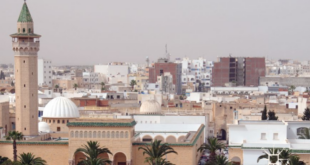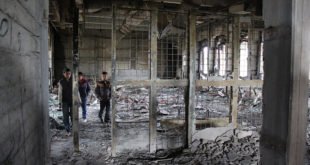
TBS: You were a member of the original BBC Arabic TV group that founded Al Jazeera. And then over the past few years you drifted away from broadcasting and towards journalism. How does it feel to be back and in such a responsible position?
Ahmed Sheikh: Jazeera.net is also journalism; it's basically the same. Actually I left Al Jazeera back in 2001 to launch the Tiba channel in Dubai. I stayed with them for six months and then returned to Doha to work for a year at the foreign information agency monitoring and organizing news briefs for the ruler and leadership of Qatar. But before I left Al Jazeera in 2001 I had launched the Arabic website. The Chairman of the board of Al Jazeera asked me to come back and launch the English site. Then last September I was brought back to the station to work on Al Shahid ("The Witness"), a documentary program like the BBC's Panorama . . . I regret having to give that show up.
TBS: One senses that Al Jazeera is at a turning point [in its] attempt to develop a new approach to its news coverage.
Sheikh: Yes, that's true. And a major part of that turning point has to do with planning, with serious forward planning. It's an eight year old problem which we have to tackle. This organization has grown very quickly, and gone from one regional news crisis to another and from one success to another. It must pause now and think about where it's going. We have to review what we've done and where we want to go and to put that all into a plan for our future. We must establish a planning culture. If we do that we will be able to take a proactive position towards news, whereas many stations in the region are still taking a reactive position to news. We have always reacted very quickly and very well but now be must go beyond that.
TBS: Could you be more specific? Otherwise our readers might think we are moving about in the realm of platitudes.
Sheikh: Here is an example of what I am talking about. We have been talking about covering the coming elections in India and for us that no longer means sending a correspondent to stand by a polling station. We need to take a look at India, at what's happening in India, the thriving middle classes, the tensions that have been emerging in this society, and we need to be there taking a look well before the elections.
Here is another change that is underway: We used to show horrible scenes of the dead and the terribly wounded, of horrendous massacres. Now that's out.
While we are talking an in-house journalist comes in to get a decision from Ahmed. It's the anniversary of the genocide in Rwanda and Al Jazeera has just received some horrendous library footage of the massacres from the news-agencies. The journalist wants to know whether or not he should use it. Ahmed says no, and returns to his theme. It's an extraordinary coincidence.
TBS: Well I couldn't have asked for a better example of what you are talking about.
Sheikh: Look, as journalists we have to watch these bloody scenes, but we don't have the right to show them. We never look back. The competition can look at our past achievements and try to match them but we must look ahead. Our real competition is the global broadcasters.
When we move to new offices in a few months we will be implementing a new plan that calls for a future planning unit consisting of three or four people responsible for entering scheduled news or obvious events into a master calendar. Thus, we will be planning for coverage well in advance of a scheduled event like an election or a major development project of historic importance.
And we are planning to develop the work of our interview section. We will try to integrate them, to give them a stronger sense of news values. Our goal will be to create that sort of integration between the assignment desk, newsgathering, the interview section and the producers working on running order that is the hallmark of a professional operation. We will prepare a style guide. Something written, that everyone shares as a reference. And we will be preparing a manual for each job. A producer's guide-what a producer should be doing, a functional expanded job description. We have to create some sort of integration between all the sections in the news room so that everyone feels that there is one team and they are part of that one team
TBS: You had it relatively easy in the beginning: the creative core of Al Jazeera came from BBC Arabic TV and some had BBC radio experience that predated the BBC Arabic TV attempt. And you could go back to that well for the first couple years-tracking down colleagues from the failed BBC Arabic TV and/or radio world service-dipping in and coming up with staff trained in specific and logical procedures. But that well dried up several years ago.
Sheikh: To sustain that legacy we need a style guide, job manuals, increased training. Indeed we are sending existing staff back into training. Mahmud Abdul Hadi, who heads up the training center will be increasing the amount of training for every employee. And we will establish an Appraisal System .
Just then pictures of badly wounded, very bloody children in a hospital scene, presumably from Falluja come up on the screen in Ahmed's office. He says "look at those bloody photographs" and walks out, presumably to talk to the producer of the news bulletin. So the process continues. Ahmed returns.
Sheikh: Before, some people in the news room had the opportunity to get out into the field but others didn't. Everyone should have a chance to prove themselves in the field, and only by giving everyone a chance can we fight off demoralization. And the [equal opportunity] that everyone will have for training will also motivate the newsroom.
A real appraisal system, plus opportunities for training, plus the encouragement and motivation that the opportunity for field work will provide, and also allowing staff with new ideas to have the opportunity . . . to develop them-all of this will give people a chance to prove themselves, to prove they are good. And those are the people who will stay with us.
And we will try and change the work flow system. Right now everybody is crowded into this little news room. Directors, library people . . . there isn't really thinking space for the journalists and producers. Instead, in the new news room, we will introduce Area Desks, let's say four people on the European News Desk, and then after six months we start rotating some of them over to the Asian News Desk. By doing that everyone in the News Room will develop a global sense of the news, of what's going on in the world and how to report it. You know I was planning to go myself to North Korea for Al Shahid.
We are sending a new correspondent [to Russia]-an Egyptian who lived in Russia for ten or fifteen years. But he will be based outside Moscow, moving around. So we will not just be reacting to Moscow's political culture but we will be taking the initiative to cover the country. And so much more could be of interest to our viewers than everyone assumes. For instance, did you know that the name "Siberia" is derived from Sabareen-referring to the local people enduring harsh conditions with patience who took [to] Islam when the Abbasids reached what is known today as Siberia?
TBS: No, I didn't know, but I find it fascinating. I'll tune in for stuff like that any day. TBS.
 Arab Media & Society The Arab Media Hub
Arab Media & Society The Arab Media Hub




